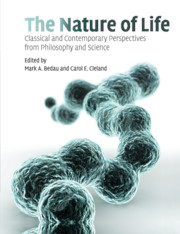Book contents
- Frontmatter
- Contents
- Preface
- Acknowledgments
- Sources
- About the authors
- Introduction
- SECTION I CLASSICAL DISCUSSIONS OF LIFE
- SECTION II THE ORIGIN AND EXTENT OF NATURAL LIFE
- SECTION III ARTIFICIAL LIFE AND SYNTHETIC BIOLOGY
- SECTION IV DEFINING AND EXPLAINING LIFE
- 23 Definitions of life
- 24 The seven pillars of life
- 25 A universal definition of life: autonomy and open-ended evolution
- 26 Does ‘life’ have a definition?
- 27 Sentient symphony
- 28 What is life?
- 29 Universal Darwinism
- 30 What is life? Was Schrödinger right?
- 31 Four puzzles about life
- Supplementary bibliography on life
- Index
23 - Definitions of life
Published online by Cambridge University Press: 10 November 2010
- Frontmatter
- Contents
- Preface
- Acknowledgments
- Sources
- About the authors
- Introduction
- SECTION I CLASSICAL DISCUSSIONS OF LIFE
- SECTION II THE ORIGIN AND EXTENT OF NATURAL LIFE
- SECTION III ARTIFICIAL LIFE AND SYNTHETIC BIOLOGY
- SECTION IV DEFINING AND EXPLAINING LIFE
- 23 Definitions of life
- 24 The seven pillars of life
- 25 A universal definition of life: autonomy and open-ended evolution
- 26 Does ‘life’ have a definition?
- 27 Sentient symphony
- 28 What is life?
- 29 Universal Darwinism
- 30 What is life? Was Schrödinger right?
- 31 Four puzzles about life
- Supplementary bibliography on life
- Index
Summary
A great deal is known about life. Anatomists and taxonomists have studied the forms and relations of more than a million separate species of plants and animals. Physiologists have investigated the gross functioning of organisms. Biochemists have probed the biological interactions of the organic molecules that make up life on our planet. Molecular biologists have uncovered the very molecules responsible for reproduction and for the passage of hereditary information from generation to generation, a subject that geneticists had previously studied without going to the molecular level. Ecologists have inquired into the relations between organisms and their environments; ethologists, the behavior of animals and plants; embryologists, the development of complex organisms from a single cell; evolutionary biologists, the emergence of organisms from preexisting forms over geological time. Yet despite the enormous fund of information that each of these biological specialties has provided, it is a remarkable fact that no general agreement exists on what it is that is being studied. There is no generally accepted definition of life. In fact, there is a certain clearly discernible tendency for each biological specialty to define life in its own terms. The average person also tends to think of life in his own terms. For example, the man in the street, if asked about life on other planets, will often picture life of a distinctly human sort. Many individuals believe that insects are not animals, because by “animals” they mean “mammals.” Man tends to define in terms of the familiar.
- Type
- Chapter
- Information
- The Nature of LifeClassical and Contemporary Perspectives from Philosophy and Science, pp. 303 - 306Publisher: Cambridge University PressPrint publication year: 2010
- 3
- Cited by



